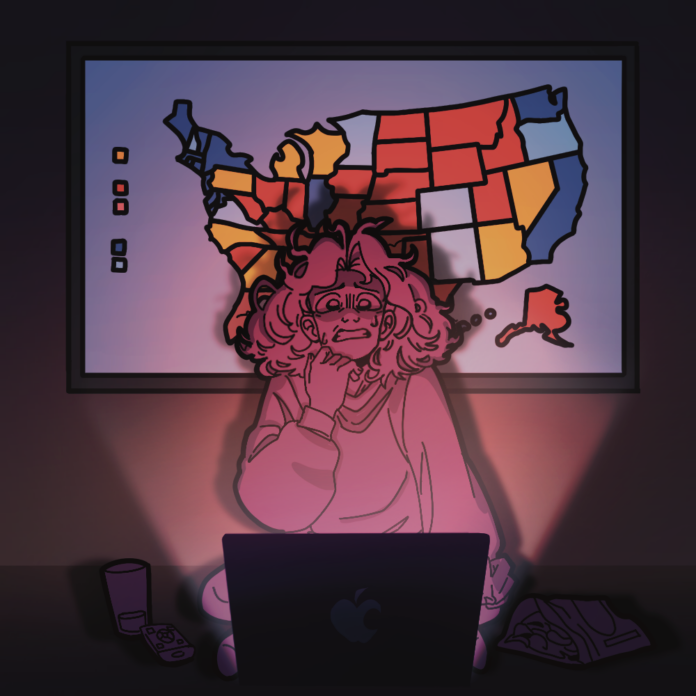I’m still waiting for the “blue shift”
By MOLLY THOMPSON – mmtthompson@ucdavis.edu
Politics are mysterious. They shouldn’t be, but they are. Our government system is complex and multifaceted, and our electoral process is convoluted. In a federal election, we’re not just dealing with a matter of tallying votes, we’re organizing early votes, absentee votes, mail-in votes and in-person votes according to the different rules each state implements, and then threading it all into the electoral college.
This is why so much confusion and so many competing claims arise every four years when it comes time to choose a new administration. There are countless factors that go into the decision, so it’s understandable that we always get a cacophony of theorizing, misinformation and bickering.
I do think it’s important to mention that I’m writing this before the election, so I can’t speak to the events as they’ve unfolded this year, but we can’t ignore that these patterns are already arising.
There’s a concept called the “red mirage” which occurs on election night. When Steve Kornacki (the national treasure that he is) stands bravely in front of that daunting, imposing, earth-shaking map of the good old U.S. of A., facing the people of our great nation (all of whom are staring into his very soul, willing him with all the Matilda telekinetic powers they can muster to color Pennsylvania one way or another), the results begin to slowly trickle in one by one. The gray map breaks out into blue and red like the floor under a 7-Eleven Icee machine, but it starts to look like cherry has been a little more popular than blue raspberry. Then it starts to look like cherry has been much more popular than blue raspberry, which is weird because we were all told they were equally favored.
The “red mirage” is an apparent conservative lead early on election night. It happens because Republican voters tend to prefer voting in-person on election day, and those votes are usually counted first. So, early in the tallying process, Republican candidates often seem to have a much more significant advantage than they do in reality.
Conversely, liberal voters are more likely to cast their votes via mail-in and absentee ballots, which are usually counted later in the process, causing the complementary “blue shift” that occurs following and counter to the “red mirage.”
This is not a new or bizarre phenomenon, but it hasn’t been as important to pay attention to in the past as it is today. Because our society is more politically hostile than it’s been in recent history and because of the conservative rhetoric of our current political actors, we need to be aware of both the red mirage and the blue shift.
Spurred by current presidential candidate Donald Trump, influential Republican figures have been laying the groundwork to claim election fraud if Vice President Kamala Harris wins on Nov. 5. They’re claiming that there will be such an apparent, right-wing lead that Democrats won’t be able to deny their victory. And, that if Harris were to take the victory, it would be undeniably fraudulent because they were winning in the beginning.
But that’s the blue shift; that’s what happens in every election cycle. The spread of this blatant misinformation is potentially dangerous, due to our volatile political atmosphere already primed to explode. If the fuse is lit, if Trump and his supporters see the red mirage and take it as evidence of a deserved Republican victory and feel slighted by Democratic votes coming in later, they’re likely to take an offensive position. The conflict that could result from their claims that “liberal votes are coming in to counter a conservative lead” could be the catalyst for serious public unrest.
The fact that cherry is more popular at the beginning doesn’t mean that blue raspberry won’t catch up later on. Die-hard cherry fans can be relentless, but there’s a reason that blue raspberry is more prevalent after all the cherry fans finish their Icees. It doesn’t mean that blue raspberry sales are rigged.
This is a prime example of the severe importance of media literacy and education. Social media spreads misinformation and disinformation like wildfire, and if we as a society don’t know how to interpret and filter it, we put ourselves in trouble. We put our democracy at stake.
As the media keeps emphasizing, this is an unprecedented election. The actual administrative outcome, as of Nov. 4, is anyone’s guess, but the public response either way is also volatile — we need to handle it all with care.
Written by: Molly Thompson — mmtthompson@ucdavis.edu
Disclaimer: The views and opinions expressed by individual columnists belong to the columnists alone and do not necessarily indicate the views and opinions held by The California Aggie









